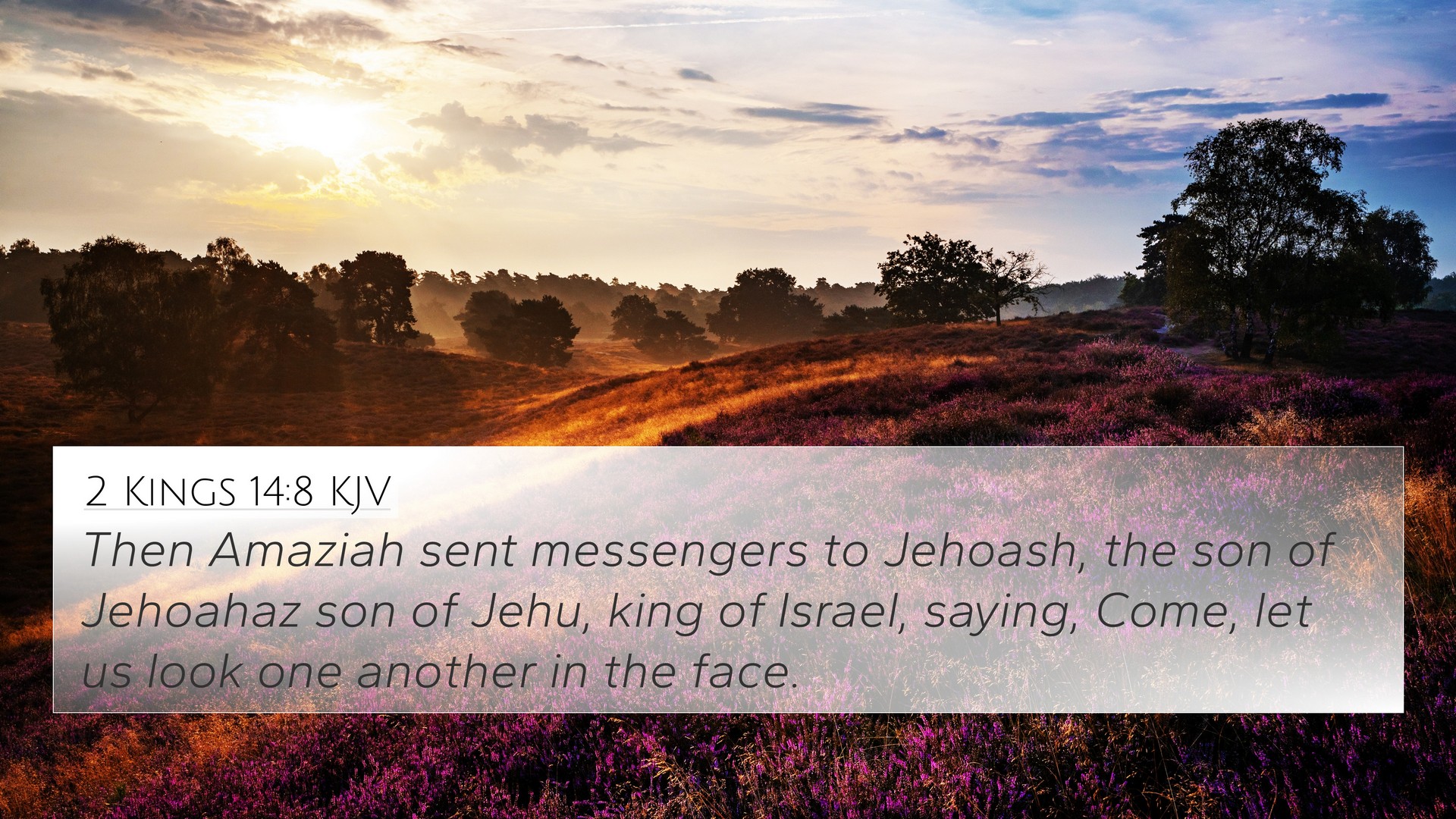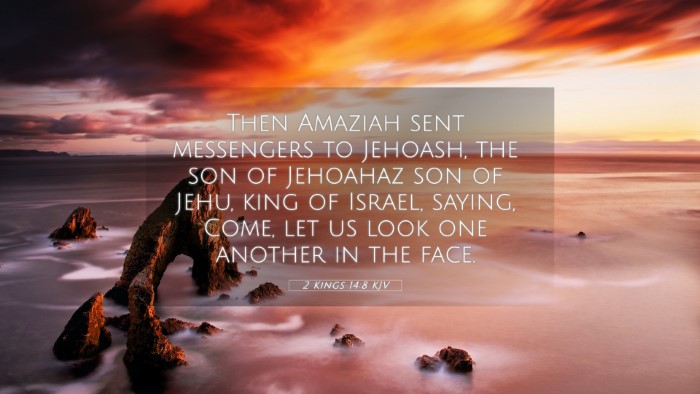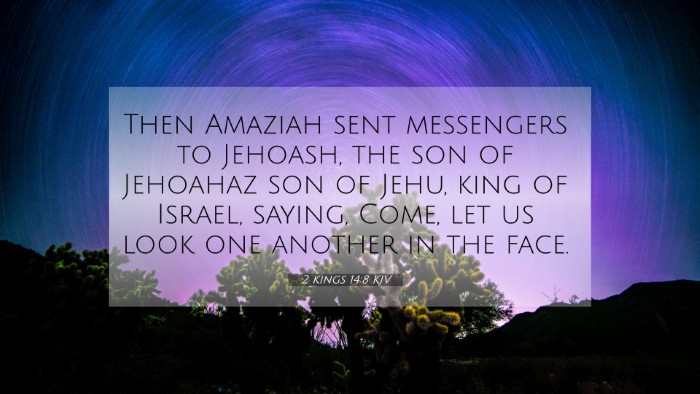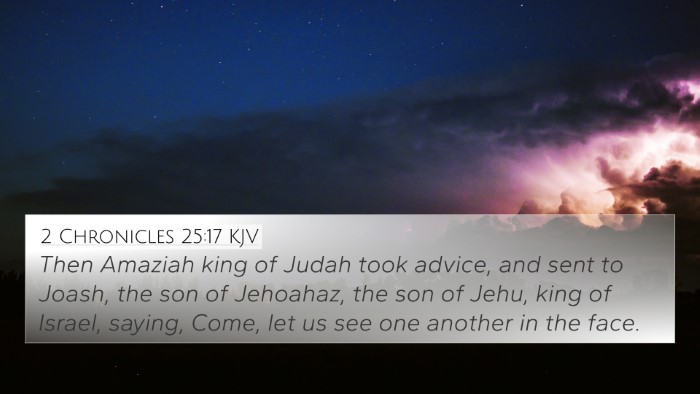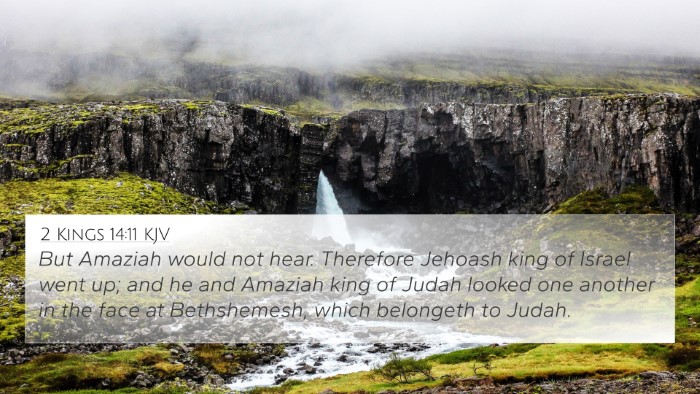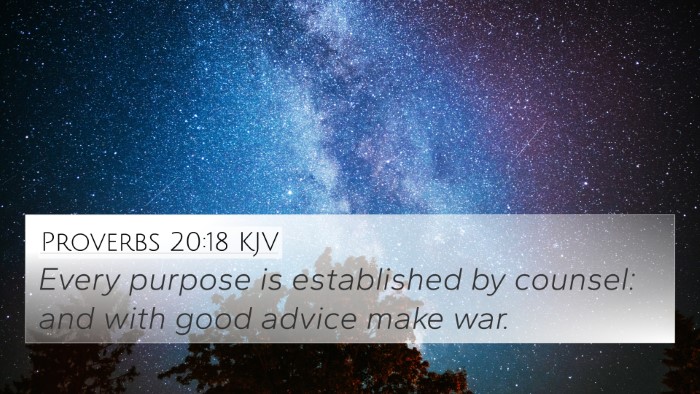Understanding 2 Kings 14:8
Verse: 2 Kings 14:8 - "Then Amaziah sent messengers to Jehoash the son of Jehoahaz, the son of Jehu, king of Israel, saying, 'Come, let us face each other.'"
Summary of the Verse
The verse depicts King Amaziah of Judah initiating a challenge to Jehoash, the king of Israel. This moment reflects a significant historical and political interaction between the two kingdoms of Israel and Judah during a time of tension and rivalry. Amaziah's message to Jehoash can be seen as a call to combat, suggesting a desire to assert his authority and strengthen his position among the neighboring kingdoms.
Contextual Analysis
To fully grasp the meaning of this verse, it is essential to consider the surrounding context. Historical factors, previous conflicts, and the nature of leadership during this period heavily influence the interpretation of this encounter.
- Amaziah's Reign: Amaziah was a king of Judah who sought to emulate the successes of his father, Joash (or Jehoash), but often failed to live up to the expectations of his lineage.
- Political Dynamics: The rivalry between Judah and Israel is marked by repeated skirmishes that underline the geopolitical tensions of the era.
- Historical Parallel: This verse mirrors themes found throughout Scripture regarding the interactions between the divided kingdoms of Israel.
Commentary Insights
Matthew Henry's Commentary
Henry posits that Amaziah’s actions reflect a grave misunderstanding of the divine dynamics at play in his kingdom. Rather than trusting in God’s deliverance, Amaziah sought to confront Israel militarily, which he suggests reveals his pride and presumption. This challenge initiated by Amaziah serves as a precursor to the tragic downfall resulting from such arrogance.
Albert Barnes' Notes
Barnes emphasizes that Amaziah's message can be interpreted both as a foolish display of bravado and a desperate act of defiance. He comments on Amaziah's potential overestimation of his own military capabilities, noting that his reliance on his own strength rather than God ultimately leads to disastrous consequences for Judah.
Adam Clarke's Commentary
Clarke provides a nuanced understanding of Amaziah’s motivations, suggesting that this invitation to battle was not merely an act of aggression but could imply a longing for respect and validation as a king. He also notes the symbolic nature of "facing each other," which in biblical terms often meant establishing one's strength and position before others, particularly in matters of honor and reputation.
Bible Verse Cross-References
This verse finds connections with several other scriptural texts, enhancing our understanding and offering a broader thematic perspective:
- 2 Kings 13:14 - This verse sets the stage for the conflict between Israel and Judah, highlighting the broader context of leadership and divine judgment.
- 2 Chronicles 25:17-24 - These verses give further insight into Amaziah’s military campaigns and the consequences of his arrogance.
- 2 Kings 14:1-7 - The account of Amaziah's ascent to the throne and his early reign illustrates his initial faithfulness to God.
- 1 Kings 20:1-34 - A reminder of previous royal conflicts, showcasing the complexities of Israel’s political landscape.
- 2 Kings 15:1-7 - The results of Amaziah’s reign and its impact on the lineage of Judah provides closure to his story.
- Micah 1:1 - The prophetic outlook during the time of Amaziah, illustrating the spiritual tone of the age.
- Isaiah 7:1-9 - A similar context of facing a rival kingdom under divine instructions serves as a contrast to Amaziah's approach.
Thematic Connections
The themes presented in 2 Kings 14:8 relate intimately to broader biblical narratives on leadership, pride, and divine sovereignty:
- Leadership and Accountability: A consistent biblical theme where leaders are responsible for guiding their people, as seen in the stories of both kings.
- Pride Before the Fall: Amaziah’s hubris is echoed in Proverbs 16:18, which warns that pride can lead to destruction.
- Trusting God vs. Military Might: The biblical narrative frequently contrasts reliance on divine support with the futility of human strength.
Practical Applications
When studying 2 Kings 14:8, several practical lessons emerge:
- Seeking Divine Wisdom: Seeking guidance from God should precede any major decisions, especially in leadership roles.
- Understanding Consequences: Every challenge or conflict has deeper implications; recognizing these helps in making informed choices.
- Humility in Leadership: True strength in leadership comes from humility and the willingness to acknowledge one's limitations.
Conclusion
2 Kings 14:8 serves as a powerful reminder of the complexities inherent in leadership and the critical need for divine guidance. Through tools for Bible cross-referencing, we can identify how interconnected the scriptures are, revealing rich theological insights. As we explore the implications of this verse, we engage in a deeper understanding of biblical narratives and their relevance to our lives today.
Keywords for Further Study:
- Bible verse cross-references
- Connections between Bible verses
- Linking Bible scriptures
- Comparative Bible verse analysis
- Bible verses that relate to each other
- Cros-referencing Biblical texts
- Thematic Bible verse connections
- Bible verse parallels
- Scriptural cross-referencing
- Inter-Biblical dialogue
